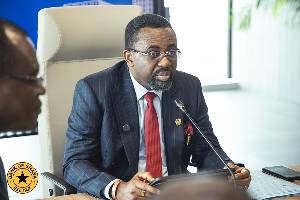The Bank of Ghana has announced a comprehensive set of new regulatory directives aimed at fortifying the stability, resilience, and transparency of Ghana’s banking sector, while creating the conditions for sustainable economic growth.
Speaking at a Post-Monetary Policy Committee (MPC) engagement with heads of banks in Accra on August 13, 2025, Governor Dr Johnson Asiama described the meeting as a “strategic platform to translate monetary policy signals into actionable banking strategies” that will ensure the macroeconomic gains achieved in recent months are “reinforced and multiplied through your balance sheets, lending decisions, and innovation agendas.”
Dr Asiama noted that the July MPC deliberations took place against a complex global economic backdrop, but stressed that Ghana’s economy had demonstrated resilience, posting 5.3% GDP growth in the first quarter of 2025, supported by strong agricultural output and a buoyant services sector.
BoG bans unapproved remittance channels, enforces weekly FX reporting by banks
Inflation has fallen to 12.1% in July, the lowest level in nearly four years, while the cedi has appreciated by over 40% against the US dollar year-to-date.
“This stability is not just a macro headline; it underpins predictable pricing, investment planning, and the attractiveness of Ghana as a financial hub,” he stated.
Among the key measures announced were:
• Credit Risk Management Directive — aligned with Basel principles, setting minimum standards for underwriting, monitoring, and provisioning.
• Bancassurance Directive — strengthening governance in bancassurance arrangements.
• Large Exposures Directive — limiting concentration risk, alongside new guidelines on credit concentration to encourage diversification.
• Liquidity Risk Management Directive — requiring banks to hold sufficient High-Quality Liquid Assets to cover 30-day stress scenarios.
• Tighter enforcement of the Foreign Exchange Act and Guidelines for Inward Remittance Services — prohibiting the use of unapproved channels and mandating weekly reporting of inward remittance transactions.
Dr Asiama emphasised that these reforms form “a single, coherent regulatory framework that not only enforces compliance with existing rules but also positions Ghana’s banking sector to withstand future shocks, compete globally, and play a stronger role in supporting sustainable economic growth.”
Leverage financial sector stability to drive economic growth – Dr Asiama to banks
The Governor urged banks to align their lending strategies with the Bank’s pro-growth stance saying, “Your task, as leaders of the sector, is to translate stability into growth to channel more credit into productive enterprises, support SMEs, finance critical infrastructure, and leverage digital innovations to reach underserved markets.”
He concluded by stressing that the stability Ghana currently enjoys “was hard-won” and called for a collective commitment to leverage it for inclusive prosperity.
The Post-MPC Engagement is part of the Bank of Ghana’s stakeholder outreach programme, providing a platform for open dialogue between the central bank and industry leaders. It ensures that monetary policy decisions are effectively communicated and operationalised within the banking sector.



